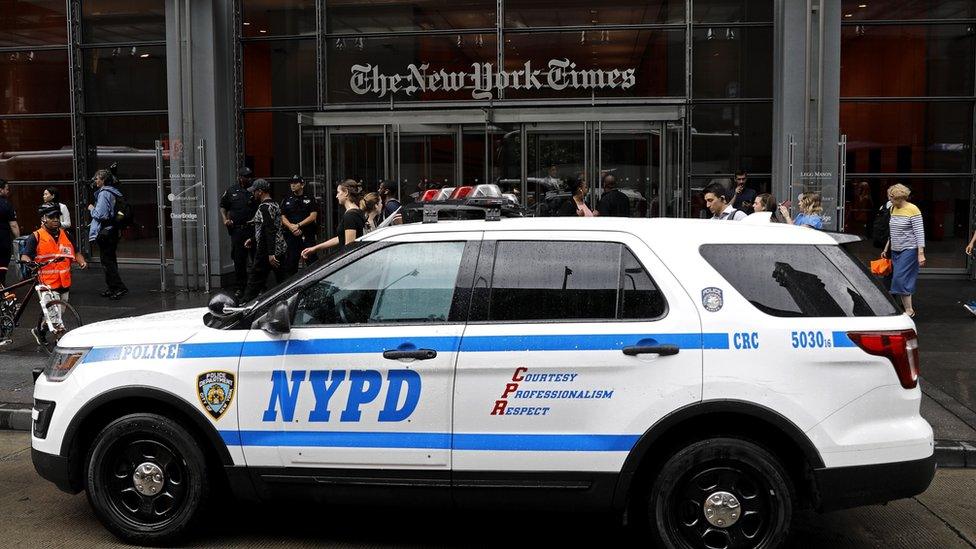Why Donald Trump attacks the media
- Published
Fox v MSNBC: How the news divides America
When President Donald Trump first called the media "enemy of the people" last year, it elicited outrage. Arizona Republican Senator Jeff Flake said it was an example of an "unprecedented" and "unwarranted" White House assault on the free press.
The second, third and fourth times Mr Trump used the phrase, it barely merited a shrug. Such is the unique talent of this president - an ability to take an action or opinion that once seemed outrageous and turn it into a new kind of normal.
Even if the line doesn't generate headlines anymore, however, journalists still take note. And when a newsroom in Maryland was sprayed with bullets just a few weeks ago, the perils of the profession - even in an established Western democracy, and with or without the president's instigation - were put in stark relief.
New York Times publisher AG Sulzberger clearly wanted to drive this point home in his previously secret meeting with Mr Trump nine days ago.
The message, however, may not have been received. In his Sunday morning tweet, the president appears to assert that it's the media's fault that he has decided to label them "enemies of the American people".
For Mr Trump, then, this kind of language - if it is a problem - is a problem for the media, not him, to fix.
'Enemy of the people' - Trump compared to Stalin for attacks on media
The irony, of course, is that Mr Trump cites New York Times reports about details of Robert Mueller's Russia investigation that are based on anonymous sources.
On Friday, he referred to the special counsel looking at his tweets - a bit of information drawn directly from a Times article.
Allow X content?
This article contains content provided by X. We ask for your permission before anything is loaded, as they may be using cookies and other technologies. You may want to read X’s cookie policy, external and privacy policy, external before accepting. To view this content choose ‘accept and continue’.
Whenever the Times runs a story about his administration with similar sourcing, however, it's "fake news".
And this gets to the heart of the matter.
The president wants positive news coverage for himself and critical coverage of his adversaries. "Fake news", "enemy of the people" and all the other media-bashing is simply a means to achieving that goal.
In sport, the strategy is called "working the referee". It's the same idea in politics - but the stakes are much higher.
Allow X content?
This article contains content provided by X. We ask for your permission before anything is loaded, as they may be using cookies and other technologies. You may want to read X’s cookie policy, external and privacy policy, external before accepting. To view this content choose ‘accept and continue’.

There's more to it than that, however. Mr Trump doesn't just want the referee's "calls" to go his way. His goal is to question the reliability the referee entirely. And it's working - at least among the president's most loyal supporters.
In a recent CBS News poll, 91% of "strong supporters" of the president's said they trust Mr Trump to provide them with accurate information, external. Only 11% said the same thing about the "mainstream media", while 63% said they trusted their own "friends and family".

Mr Sulzberger warned that Mr Trump's rhetoric could lead to violence
The president's war of words with the media has contributed to a base of support that is, effectively, invulnerable to negative news.
The question now is whether that base is enough to prevail in the upcoming mid-term congressional elections and, eventually, carry him to re-election victory in 2020.
It is, at the very least, a good place to start - and a reason why the president may stick to his current course, in spite of Mr Sulzberger's words of caution.